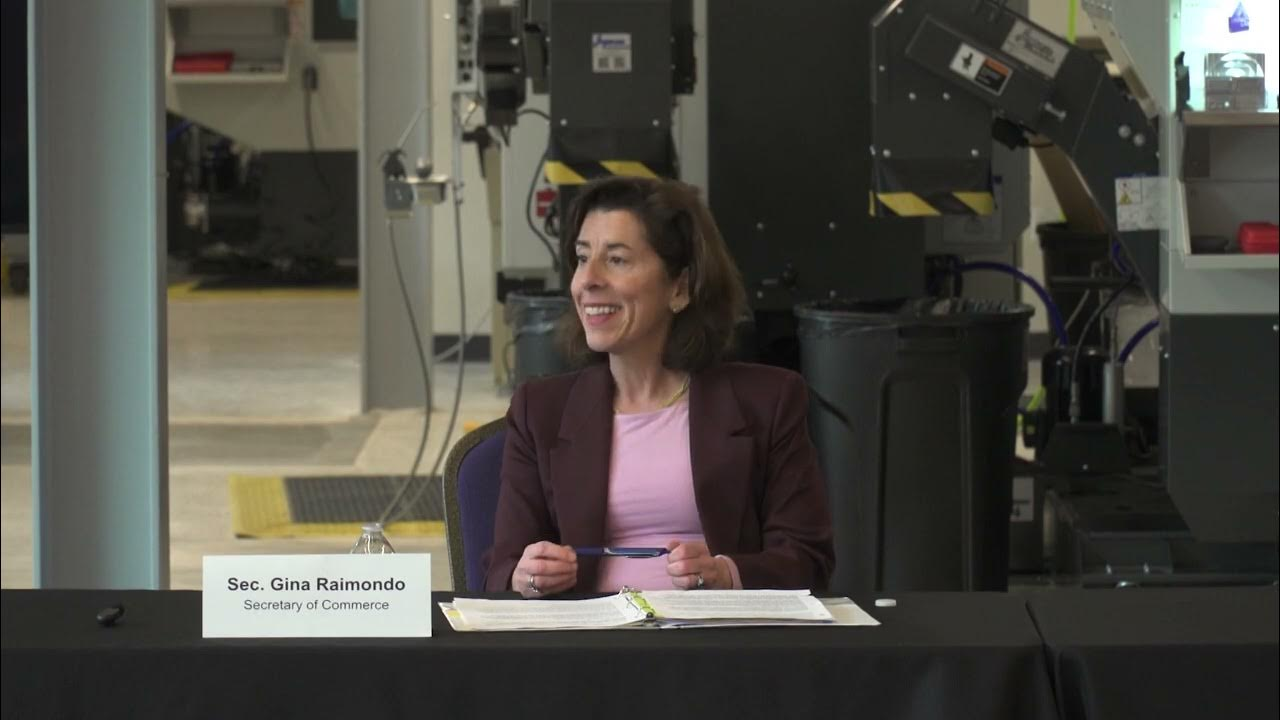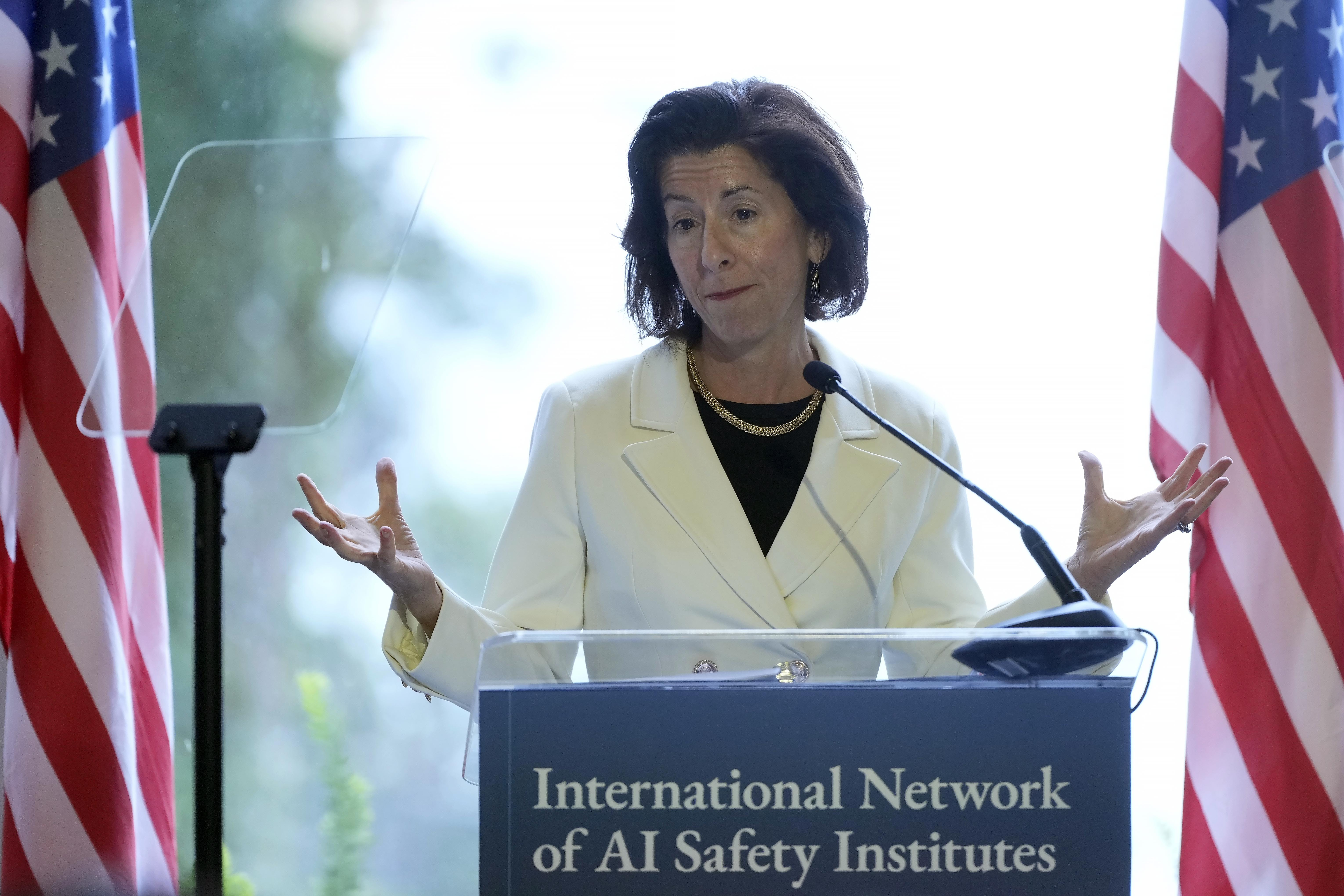
Gina Raimondo Impact: Driving Economic Change in America
Gina Raimondo’s impact as the U.S. Commerce Secretary has been notable, especially in her approach to economic reform and infrastructure investment. Her tenure has not only centered on fostering a more competitive U.S. economy but also on championing policies that directly benefit everyday Americans. Under her leadership, critical initiatives such as the CHIPs and Science Act illustrate her commitment to reshaping America’s technological landscape and securing supply chains. Furthermore, Gina Raimondo’s focus on reducing regulations and investing in education showcases her pragmatic political leadership, ensuring that improvements do not come at the cost of workers’ well-being. As she often states, positive change requires a willingness to “break things,” but it is essential to prioritize fairness in the process.
Gina Raimondo has made a mark as a pivotal figure in American economic policy, particularly during her time as the Secretary of Commerce. Her strategy emphasizes the importance of innovative approaches to enhance the nation’s economic framework while navigating the complexities of modern governance. By advocating for investments in infrastructure and advancing significant legislative measures, she plays a crucial role in promoting growth and sustainability within the economy. Her leadership style reflects a commitment to empowering the workforce and ensuring that reforms contribute to the public’s welfare. This focus on creating equitable opportunities is paramount in her ongoing effort to reshape the landscape of U.S. economic policies.
Gina Raimondo’s Vision for Economic Reform
Gina Raimondo has been a trailblazer in economic reform during her time as both the Governor of Rhode Island and as the U.S. Commerce Secretary. Her approach to governance emphasizes practical solutions over traditional methods, focusing on what she coined as ‘breaking things’ to foster real change. This philosophy led her to implement policies that not only reduced taxes but also increased the minimum wage and made community college tuition-free. These changes reflect her commitment to enhancing economic opportunities for all, particularly for those in underserved communities. Raimondo’s policies are centered on the belief that systemic reform is necessary for both economic growth and equity.
Under her leadership, significant infrastructural investments were undertaken, notably her instrumental role in the creation of the Biden administration’s Infrastructure Investment and Jobs Act. Raimondo believes in the connection between a robust infrastructure and economic competitiveness, asserting that improvement in public works lays the foundation for job creation and sustainable economic development. Through her policies, she aims to address the widening gap between the rich and the poor, ensuring that economic reform translates into tangible benefits for regular Americans.
Strengthening U.S. Supply Chains Amid Global Challenges
As the former U.S. Commerce Secretary, Gina Raimondo was faced with unprecedented challenges, particularly during the COVID-19 pandemic. The initial disruptions in global supply chains highlighted the fragility of these systems, prompting immediate and strategic responses from the Biden administration. Raimondo’s approach involved meticulous analysis of critical supply chains, particularly in pharmaceuticals, to understand vulnerabilities. Her emphasis on collaboration with international partners, including nations in Southeast Asia, exemplifies her belief that America’s economic prosperity relies on strong global ties. She effectively articulated President Biden’s vision that the U.S. should not navigate these challenges in isolation but rather work collaboratively with other nations.
Raimondo’s leadership during the pandemic also led to the introduction of the CHIPs and Science Act, a pivotal piece of legislation aimed at revitalizing domestic semiconductor production. By strategically reconfiguring America’s manufacturing capabilities, she has positioned the country to mitigate risks associated with dependence on foreign supply chains, particularly from China. Her foresight in recognizing the national security implications of semiconductor production has led to plans for significant increases in domestic chip manufacturing. This initiative not only strengthens economic resilience but also fosters job creation in high-tech industries, aligning with her broader economic reform goals.
Political Leadership: Navigating Challenges with Integrity
In her role as a political leader, Gina Raimondo has faced numerous challenges, from economic downturns to public health crises. Her tenure has demonstrated a commitment to pragmatic decision-making, often asserting that effective political leadership requires difficult compromises. Despite criticisms regarding her methods, she remains steadfast in her belief that change can occur without sacrificing the well-being of citizens. Her experience as Rhode Island’s governor during the pandemic uniquely positions her to understand the pressing need for economic stimulus and support programs, especially for the unemployed.
Raimondo’s commitment to social equity is evident in her policy choices that prioritize labor market participation, particularly for women and marginalized groups. By integrating childcare solutions into economic recovery plans, she has crafted a narrative that links social policies with economic imperatives. This forward-thinking approach reinforces the importance of comprehensive strategies in political leadership, ensuring that economic health and social welfare are not mutually exclusive but rather interdependent.
The Role of Infrastructure Investment in Economic Growth
Gina Raimondo has consistently highlighted the critical role of infrastructure investment in driving economic growth. During her tenure as Commerce Secretary, she recognized that robust infrastructure not only enhances efficiency but also attracts businesses and promotes job creation. Her advocacy for the Infrastructure Investment and Jobs Act illustrates her understanding that investing in public works leads to long-term economic benefits. By prioritizing infrastructure, she aims to bolster the U.S. economy in a manner that is sustainable and equitable.
Moreover, Raimondo’s focus on infrastructure is intricately tied to her vision of a digitally connected society. Investments in transportation, energy, and broadband are fundamental to preparing the economy for the future. Her policies advocate for a comprehensive overhaul of outdated systems, emphasizing modernization as key to maintaining America’s competitiveness on a global scale. Through these efforts, she aims not only to repair failing infrastructure but also to create jobs and stimulate economic activity across the nation.
Gina Raimondo’s Approaches to Balancing Budgets and Growth
A hallmark of Gina Raimondo’s leadership is her focus on fiscal responsibility in conjunction with economic growth. During her time in office, she championed the principle that government spending must be complemented by private sector investment. Her assertion that for every dollar allocated, there should be ten dollars from the private sector reflects a strategic approach to budget management that prioritizes sustainability. This model serves as a framework for her policies, ensuring that economic reforms are not only ambitious but also practical and responsible.
Raimondo’s understanding of economic principles extends to her defense of stimulus measures initiated during the COVID-19 pandemic. While acknowledging the inflationary pressures resulting from large-scale spending, she argues that targeted stimulus was crucial in preventing higher unemployment rates. Her balanced approach to economic policies illustrates her capability to navigate complex financial landscapes while advocating for initiatives that support community resilience. This dual focus on growth and responsible governance positions her as a leader capable of adapting to shifting economic realities.
Community College: Enhancing Accessibility Through Policy
Gina Raimondo’s policy achievements reflect her commitment to enhancing access to education, particularly through initiatives like making community college tuition-free. This reform was designed to provide opportunities for those who face financial barriers to higher education. By reducing educational costs, Raimondo aimed to empower individuals to pursue vocational training or academic degrees without the crippling burden of student debt. This initiative not only promotes personal growth but also supports workforce development, creating a more skilled labor force that can meet the needs of a rapidly changing economy.
Moreover, the decision to make community college tuition-free embodies Raimondo’s broader vision of inclusive economic policy. She understands that education plays a crucial role in economic mobility, especially for disadvantaged communities. By investing in community colleges, she is addressing systemic inequalities that limit access to quality education. Her policies reflect a holistic approach to economic reform, recognizing the interconnectedness of education, workforce development, and prosperity.
Gina Raimondo’s Legacy in Political Leadership
As a prominent figure in American politics, Gina Raimondo has left a significant mark as a leader driven by reform and accountability. Her leadership style embodies a commitment to challenging the status quo, even when it involves difficult decisions and trade-offs. This steadfastness has garnered her respect as a politician who prioritizes the needs of the everyday citizen over entrenched political interests. Her legacy is one of courage in the face of adversity, demonstrating that effective political leadership can lead to substantial change, even within a fragmented political landscape.
Raimondo’s political journey is a testament to her dedication to creating a fairer economy and an inclusive society. Through policies designed to uplift all Americans, especially those struggling to make ends meet, she embodies the spirit of servant leadership. By championing equity in her policies, she sets a standard for future leaders, showing that economic reform is not just about numbers and budgets, but about people and their potential. Her influence as a leader will continue to resonate, providing a blueprint for those who come after her.
Adapting to Economic Shifts: Lessons from Gina Raimondo
Gina Raimondo’s tenure provides vital lessons on adapting to economic shifts and challenges. Her insightful understanding of the interplay between global events and domestic policy helped guide the U.S. through tumultuous times, emphasizing the importance of flexibility in economic strategies. The COVID-19 pandemic, for example, necessitated swift action to protect jobs and stabilize the economy, highlighting Raimondo’s capacity to make quick, data-driven decisions that prioritize both immediate needs and long-term stability.
Additionally, her experience illustrates the significance of building partnerships, whether at home or abroad. Raimondo’s recognition that international cooperation is crucial for addressing complex issues like supply chain disruptions underscores her strategic thinking. Her proactive approach to fostering relationships with other countries speaks to the essence of modern governance, where collaboration is increasingly vital in navigating a globalized economy. The lessons gleaned from her leadership will inform future policies aimed at ensuring resilience against unforeseen economic challenges.
Frequently Asked Questions
What is the impact of Gina Raimondo’s policies on economic reform?
Gina Raimondo’s policies have significantly impacted economic reform by emphasizing tax cuts, raising the minimum wage, and making community college tuition-free during her tenure as Governor of Rhode Island. As U.S. Commerce Secretary, her initiatives, including the CHIPs and Science Act, sought to revitalize American manufacturing and enhance competitiveness, demonstrating her commitment to progressive economic reforms.
How did Gina Raimondo’s leadership as U.S. Commerce Secretary influence infrastructure investment?
As U.S. Commerce Secretary, Gina Raimondo was instrumental in advancing infrastructure investment through the Biden administration’s Infrastructure Investment and Jobs Act. Her focus on building relationships globally and fostering domestic semiconductor production is set to enhance U.S. infrastructure and national security, illustrating her significant impact on the nation’s economic landscape.
In what ways did Gina Raimondo address the challenges of supply chains during her tenure?
Gina Raimondo tackled supply chain challenges by analyzing critical supply chains during the COVID-19 pandemic. She developed strategies to strengthen international partnerships, particularly in Southeast Asia, to ensure the availability of essential goods and bolster the U.S. economy, highlighting her proactive approach to managing economic disruptions.
What key achievements define Gina Raimondo’s impact on political leadership?
Gina Raimondo’s impact on political leadership is defined by her transformative policies in Rhode Island, such as consistent tax reductions and labor market enhancements. Her role in the Biden administration, focusing on bilateral relations and economic resiliency through reforms like the CHIPs and Science Act, underscores her effectiveness and innovative leadership in addressing both national and local economic challenges.
How did Gina Raimondo’s initiatives during the COVID-19 pandemic affect the U.S. economy?
Gina Raimondo’s initiatives during the COVID-19 pandemic aimed to stabilize the U.S. economy through significant stimulus measures and support for affected workers. Her approach to integrating social programs with economic recovery plans reflected a comprehensive strategy to ensure labor market participation and economic revitalization, highlighting her impactful leadership during a critical time.
What role did Gina Raimondo play in the Biden administration’s approach to economic policy?
In the Biden administration, Gina Raimondo played a crucial role in shaping economic policy, particularly through her advocacy for infrastructure investment and addressing supply chain vulnerabilities. Her leadership in implementing the CHIPs and Science Act aimed to boost domestic semiconductor production, illustrating how her strategic initiatives have been vital to the administration’s broader economic objectives.
What challenges did Gina Raimondo face in implementing her economic policies as U.S. Commerce Secretary?
As U.S. Commerce Secretary, Gina Raimondo faced challenges such as navigating a divided Congress and addressing immediate economic crises like the COVID-19 pandemic. Despite these obstacles, she successfully promoted policies aimed at strengthening the economy, reflecting her ability to adapt and lead effectively within the complexities of the current political landscape.
How has Gina Raimondo’s focus on fairness influenced her economic policies?
Gina Raimondo’s focus on fairness has deeply influenced her economic policies by prioritizing equitable growth and opportunities for all Americans. Her initiatives to raise wages and improve workforce participation through childcare provisions exemplify her commitment to ensuring that economic reform benefits everyone, aligning her political vision with practical economic strategies.
| Key Points |
|---|
| Gina Raimondo emphasizes the need for change to improve the economy while avoiding harm to people. |
| As Governor, she cut taxes, increased minimum wage, made community college tuition free, and reduced regulations by 30%. |
| She highlights the importance of execution in change, distinguishing her approach from others like Elon Musk. |
| Raimondo’s family background and experiences inspired her to advocate for the ‘little guy’ and pursue a political career. |
| During COVID, she focused on understanding and strengthening supply chains to respond to shortages. |
| The CHIPs and Science Act aims to bring semiconductor manufacturing back to the U.S. for national security reasons. |
| Raimondo claims that fiscal responsibility was prioritized in the CHIPs act, leveraging private sector investments. |
| She notes the importance of fair trade practices and reciprocity with countries like China. |
| Raimondo reflects on her time in politics, acknowledging mistakes while emphasizing achievements despite challenges. |
| She defends the Biden stimulus act’s large size as necessary to combat unemployment during COVID. |
| Raimondo stresses the need for childcare programs to support women’s participation in the labor market. |
Summary
Gina Raimondo’s impact is evident in her commitment to driving economic progress while prioritizing the well-being of individuals. Throughout her political career, she has advocated for meaningful changes that challenge the status quo. From her tenure as Rhode Island Governor to her role as U.S. Commerce Secretary, Raimondo has not only pushed for innovative legislation like the CHIPs and Science Act but has also articulated the necessity of responsible fiscal policies that hold the private sector accountable. Her focus on creating equitable opportunities and nurturing the workforce reflects her dedication to ensuring that the American Dream remains accessible to all.


